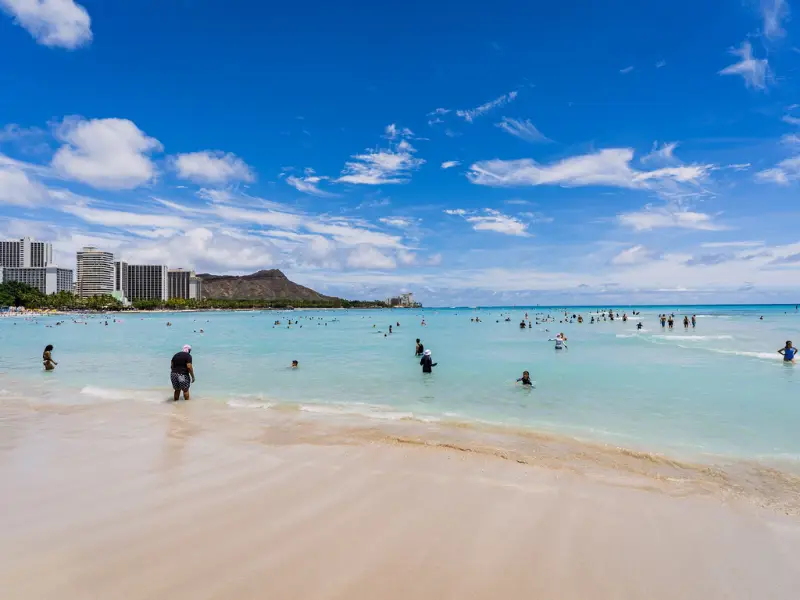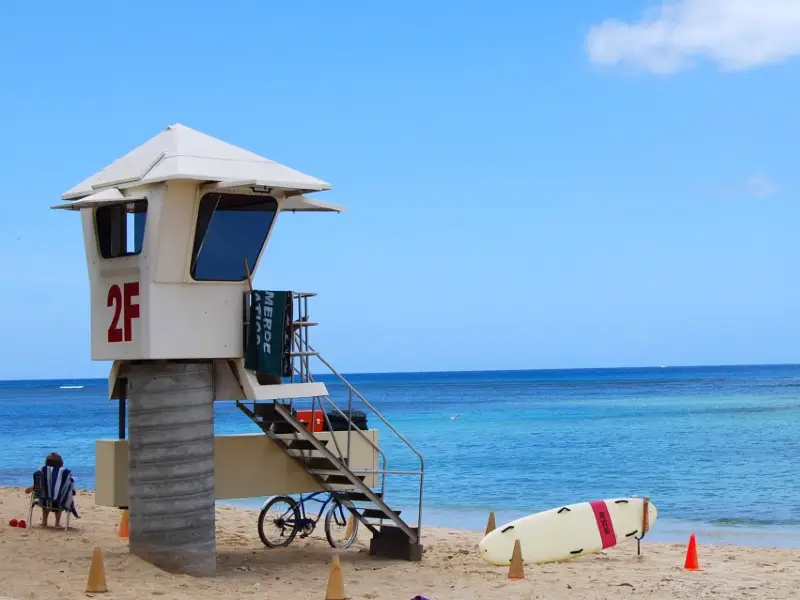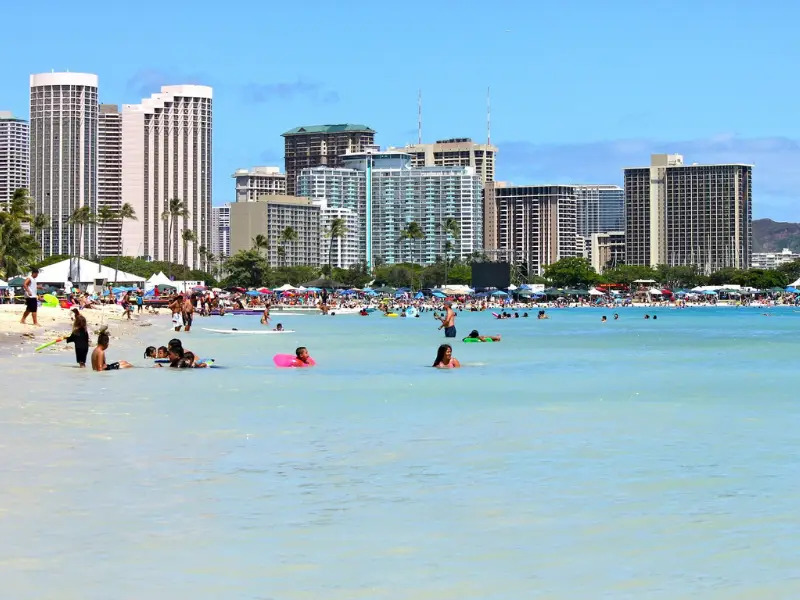Did you know that Waikiki in Honolulu attracts more than 72,000 visitors on any given day of the year? That’s a lot of people and accounts for almost half of all the tourists in the State of Hawaii! And for good reason… with white sand, turquoise blue water and so many activities to do both on land and in the sea, Waikiki is a tropical paradise.
But as we all know, sometimes more people equals more problems.
If you’ve been thinking about planning a trip to Waikiki in Hawaii and are unsure of where to start, here is everything you need to know about both the safety of the area and the swimming conditions in the ocean.
Is Waikiki Beach Safe?
Table of Contents
Is Waikiki Beach a Safe Area to Visit?🏖
The simple answer is yes! Waikiki remains one of the safest tourist destinations in the world. Over the past few years, there have been several adverse incidents, but this is somewhat expected given the population of Waikiki is fairly dense with over 25,000 people living in 3.4 square miles.
As with any well-known tourist destination, criminal activity makes national headlines. The majority of crime in the Waikiki area is theft.
As long as you remain mindful of your surroundings and practice basic safety precautions, Waikiki is no more dangerous than any other beach side city.
Current Waikiki Safety Issues in 2023
After 2 long years of a pandemic, the world is opening back up to travel. This is really great news! And areas such as Waikiki who rely on tourism for income are just as excited as the tourists who have missed flocking to these exotic places.
The majority of locals in Waikiki want you and your money there and crime rates, especially violent crimes, have dropped significantly since 2022. Property crime has decreased by 17% from 2021 to 2022 and Hawaii is one of the 15 states who has seen a decrease in violent crime in the past year.
How Safe is Waikiki at Night?
Waikiki is quite safe and has a strong police presence, especially at night. That being said, be sure to stay vigilant, walk in well-lit areas at night and try to avoid dark sketchy looking alleys. Use common sense and don’t separate from your group to try to walk home alone at night, if at all possible.
Is Waikiki Beach Safe to Swim?🏊🏻

Waikiki Beach is a haven for ocean related recreational activities! From swimming to snorkeling to surfing and all things in between, the ocean surrounding Waikiki is a water lover’s dream come true. As with any wild body of water, conditions can change rapidly so be sure to take the necessary precautions you would in any non controlled environment.
Does Waikiki Beach have Lifeguards?🦺

The majority of the beaches in Waikiki have lifeguard stations on site. These stations have flags that indicate the current tide conditions. Green flags mean safe swimming, yellow means caution and red means danger.
Most of the beaches in Waikiki also have public showers and bathrooms which doesn’t have a whole lot to do with safety, but is a big bonus when you’ve gotta go or want to rinse off the salt water and sand after a day at the beach!
Are there Sharks or any other Dangerous Creatures Lurking in the Ocean at Waikiki?🦈
Although there are occasional shark sightings in Waikiki, there are zero reported shark attacks in the past 150 years. Sharks are just as afraid of you as you are of them. If you have a fear of sharks, just stay close to others while swimming or snokeling and chances are they won’t even come close to the group.
The greater threat in the waters around Waikiki is jellyfish. They usually arrive around 7 days after a full moon and stick around for a few days. Jellyfish stings are usually not fatal in Hawaii, but also not that pleasant. Be sure to look for posted warning signs.
Another ocean creature you want to avoid in the waters around Waikiki is the dreaded sea urchin. These look like a black pin cushion and live in pockets around the coral reef. The best rule of thumb is to avoid touching anything in the water, even if it looks completely benevolent.
Is Waikiki Beach Area Safe for Families with Kids?
With lots of family kid-friendly resorts lining the shores of Waikiki, the beaches are safe and welcoming for families with children. Many of the hotels offer children’s programs to keep the kiddos busy throughout the day. Just make sure to keep an eye on the littles if they decide to swim in the water.
🏖 Suggested read: Maui vs Honolulu for Family Vacation? An honest comparison to HELP you Decide!
Is Waikiki Beach Area Safe for Solo Female Travellers?
Waikiki is known for being a safe place for solo female travelers. As mentioned earlier, the police presence is strong, but there are also a ton of local good Samaritans that are willing to help out in case there is a creeper making you feel uncomfortable. Plus, with lots of social opportunities, meeting other female solo travelers is easy.
Conclusion
The bottom line with safety in Waikiki is don’t do anything dumb that you wouldn’t normally do at home. Waikiki offers so many activities and things to do from the ocean, to the beach, to the land, that you can truly have a vacation of your dreams when you use common sense and follow the above safety tips. Have a great vacation… Aloha, Mahalo and A Hoi Hou- until we meet again!
🏖 You may also like: Is Clearwater Beach Safe to Swim? Everything You Need to Know!
General Safety Tips to follow when on Waikiki Beach
1) First of all, make sure you obey all signs on the beach including tide warning flags.
2) Swim at your own risk and make sure you watch children closely at all times as tides can change fast.
3) Avoid getting too close to coral reefs as they are very sharp and can cut you, as well as the damage that can be caused to the fragile reef ecosystem.
4) Unless you are an extremely experienced swimmer, avoid going out beyond the reef barrier.
5) And of course, always wear waterproof sunscreen, preferably one that is reef approved.

